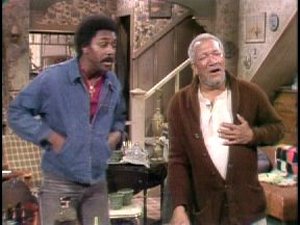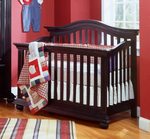 The CPSC says the "clarification" issued today about the new CPSIA lead-testing regulations which go into effect Feb. 10. is "Intended for Resellers of Children's Products, Thrift and Consignment Stores." But it's also great news for thrifters, eBay sellers, craigslisters, and people reduced to selling shit out of the trunk of their car on the side of the road--in other words, Every Family In America.
The CPSC says the "clarification" issued today about the new CPSIA lead-testing regulations which go into effect Feb. 10. is "Intended for Resellers of Children's Products, Thrift and Consignment Stores." But it's also great news for thrifters, eBay sellers, craigslisters, and people reduced to selling shit out of the trunk of their car on the side of the road--in other words, Every Family In America.
The CPSC says resellers of childrens' products do not need to test and certify that all their inventory complies with the new safety, lead, or phthalates standards. But they're still not allowed to sell children's products that don't meet CPSIA standards, and it's now officially illegal to sell recalled items, and they still face civil and/or criminal penalties if they do. So caveat vendor.
Or as the email announcement put it,
The agency intends to focus its enforcement efforts on products of greatest risk and largest exposure. While CPSC expects every company to comply fully with the new laws resellers should pay special attention to certain product categories. Among these are recalled children's products, particularly cribs and play yards; children's products that may contain lead, such as children's jewelry and painted wooden or metal toys; flimsily made toys that are easily breakable into small parts; toys that lack the required age warnings; and dolls and stuffed toys that have buttons, eyes, noses or other small parts that are not securely fastened and could present a choking hazard for young children.Hmm, I added italics to the sentence which was omitted from the website version of the clarification. I guess it made it a little too clear that after three decades of chronic, enforced impotence and underfunding, a newly invigorated, efficient, and enforcement-obsessed CPSC is not suddenly going to launch nationwide lead raids of consignment stores.
CPSC Clarifies Requirements of New Children's Product Safety Laws Taking Effect in February
Guidance Intended for Resellers of Children's Products, Thrift and Consignment Stores [cpsc.gov]
Compare the mailing list version after the jump.
News from CPSC
U.S. Consumer Product Safety Commission
Office of Information and Public Affairs
Washington, D.C. 20207
For Immediate Release CPSC Recall Hotline: (800) 638-2772
January 8, 2009 CPSC Media Contact: (301) 504-7908
Release #09-086
CPSC Clarifies Requirements of New Children's Product Safety Laws Taking Effect in February
Guidance Intended for Resellers of Children's Products, Thrift and Consignment Stores
Washington, D.C. - In February 2009, new requirements of the Consumer Product Safety Improvement Act (CPSIA) take effect. Manufacturers, importers and retailers are expected to comply with the new Congressionally-mandated laws. Beginning February 10, 2009, children's products cannot be sold if they contain more than 600 parts per million (ppm) total lead. Certain children's products manufactured on or after February 10, 2009 cannot be sold if they contain more that 0.1% of certain specific phthalates or if they fail to meet new mandatory standards for toys.
Under the new law, children's products with more than 600 ppm total lead cannot lawfully be sold in the United States on or after February 10, 2009, even if they were manufactured before that date. The total lead limit drops to 300 ppm on August 14, 2009.
The new law requires that domestic manufacturers and importers certify that children's products made after February 10 meet all the new safety standards and the lead ban. Sellers of used children's products, such as thrift stores and consignment stores, are not required to certify that those products meet the new lead limits, phthalates standard or new toy standards.
The new safety law does not require resellers to test children's products in inventory for compliance with the lead limit before they are sold. However, resellers cannot sell children's products that exceed the lead limit and therefore should avoid products that are likely to have lead content, unless they have testing or other information to indicate the products being sold have less than the new limit. Those resellers that do sell products in violation of the new limits could face civil and/or criminal penalties.
When the CPSIA was signed into law on August 14, 2008, it became unlawful to sell recalled products. All resellers should check the CPSC Web site (www.cpsc.gov) for information on recalled products before taking into inventory or selling a product. The selling of recalled products also could carry civil and/or criminal penalties.
The agency intends to focus its enforcement efforts on products of greatest risk and largest exposure. While CPSC expects every company to comply fully with the new laws resellers should pay special attention to certain product categories. Among these are recalled children's products, particularly cribs and play yards; children's products that may contain lead, such as children's jewelry and painted wooden or metal toys; flimsily made toys that are easily breakable into small parts; toys that lack the required age warnings; and dolls and stuffed toys that have buttons, eyes, noses or other small parts that are not securely fastened and could present a choking hazard for young children.
The agency has underway a number of rulemaking proposals intended to provide guidance on the new lead limit requirements. Please visit the CPSC website at www.cpsc.gov for more information.
*****!!! Unless otherwise stated, any views or opinions expressed in this e-mail (and any attachments) are solely those of the author and do not necessarily represent those of the U.S. Consumer Product Safety Commission. Copies of product recall and product safety information can be sent to you automatically via Internet e-mail, as they are released by CPSC. To subscribe or unsubscribe to this service go to the following web page: https://www.cpsc.gov/cpsclist.aspx *****!!!




It still states that manufacturers have to certify their merchandise meets the safety law requirements. And although good news for resale shops and the like what do people think is to happen a little into the future? If most of the local designers and smaller manufacturing companies close their doors, that eventually affects resale shops as well. People will keep their children's clothes & toys in storage until they find a friend or family member to pass them down to or sell them at garage sales/ebay/craigslist. People will finally realize that name brand isn't worth the money. I do not believe this clarification really is an improvement. It's just a bone being thrown for those dumb enough to open their mouths for it.
Consignment and thrift stores are a major supplier of children's clothes in rural areas. Here's a piece from an East Texas station (dated the same day as the CPC note above) about the issue. The headline is "New lead toy law to protect children", but the lead is "While the consumer product safety commission calls it a move toward safety others call it an invasion. Some business owners are shaking their heads."
Link (if I do it right and if it's allowed): New lead toy law to protect children
[i just coded it in by hand. easiest way is to use the a href tag. -ed.]